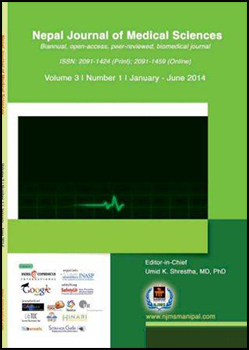Knowledge, Attitude and Practice Survey Tool for Intellectual Disability (KAP-ID)
DOI:
https://doi.org/10.3126/njms.v3i1.10345Keywords:
intellectual disability, survey, tool, public health, community based rehabilitation, low and middle-income countryAbstract
Background: Community based rehabilitation approach is very popular in providing rehabilitation services to the people with intellectual disability in low and middle income countries. It is useful to assess level of knowledge, attitude and practices of parents and relatives of people with intellectual disabilities for strategic planning of the program.
Method: series of meetings, focus groups and in-depth interviews with the professionals employed in community based rehabilitation project and workers, and community members were conducted. Common questions around the issues related with intellectual disabilities were collected and discussed. These questions were refined with consultation, references with existing literature and field testing.
Result: We have developed and tested a Knowledge, Attitude and Practice survey tool for Intellectual Disability (KAP-ID) in a resource poor setting of a middle income country, India. This tool contains fifteen questions.
Conclusion: This brief survey tool is helpful in assessing knowledge, attitude and practices of parents, relatives and also of the community on intellectual disabilities. Information gained through the survey on KAPID found to be useful in designing the behavioral, awareness, educational, health promotional, and interventional program for the population with intellectual disabilities in rural poor settings.
Nepal Journal of Medical Sciences | Volume 03 | Number 01 | January-June 2014 | Page 22-25
Downloads
Downloads
Published
How to Cite
Issue
Section
License
Copyright © by Nepal Journal of Medical Sciences. The ideas and opinions expressed by authors of articles summarized, quoted, or published in full text in this Journal represents only opinions of authors and do not necessarily reflect the official policy of Nepal Journal of Medical Sciences or the institute with which the author(s) is (are) affiliated, unless so specified.




